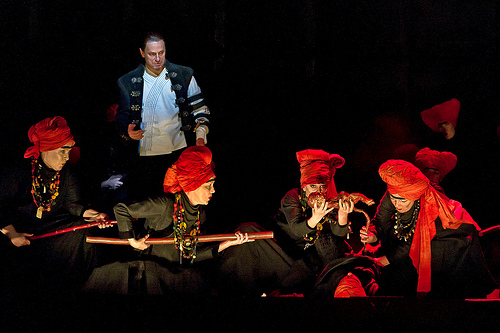[Published on A Younger Theatre, read the original piece here]
According to Operabase, Verdi’s Macbeth is the 29th most performed opera, ranking higher than Cavalleria Rusticana and Salome. Perhaps with the intention of helping it climb up a few positions, The Royal Opera is restaging Phyllida Lloyd’s 2002 production, and does so with intelligence, charm, and creativity.
The first striking element of the production is its compelling aesthetics designed by Anthony Ward: black, gold and red dominate the stage, embodying the deadly mixture of mystery, power and slaughter that imbue the Shakespearean tragedy. Fascinated by Shakespeare’s work, Verdi wanted his opera to be just as spectral and haunted. This is achieved (also) thanks to the chorus of witches, who wear conspicuous scarlet turbans and handle scary sticks. One could finger-point their not-so-accurate Italian diction, but that was almost negligible. Energetic and inexorable, much like fate, they are a powerful and pervasive presence on stage.

Simon Keenlyside as Macbeth in Macbeth © ROH / Clive Barda 2011
The numbers of the strong cast matches the success of the collective scenes. The shining stars of the production are Anna Netrebko as Lady Macbeth and Željko Lučić as her husband. Netrebko is as devilish and spirited (peaking in the sleepwalking scene “Una macchia è qui tutt’ora”) as Lučić is deeply tormented and regretful. Netrebko is invariably (and rightly) cheered after every aria by the audience, while Lučić proved an extremely versatile an actor, as last time I saw him he was a relentless Scarpia in the Metropolitan Opera’s Tosca.
There are two more reasons why this is a must-see production of Macbeth. The first is the fine moment where Verdi’s passion for patriotic themes crops up. The aria “Patria oppressa! il dolce nome” voices the laments of the Scottish refugees, who are suffering while their leaders compete for power. The sentiments of a people living in an oppressed country (which reminds one of Nabucco’s aria ‘Va pensiero’) are represented with a touching, well-orchestrated collective scene. Scotland is a nation made up of women and men, the implied message seems to be, and not just a trophy to be conquered by killing as many opponents as it is necessary.
The second great scene is the tenderly human moment where the Macbeths are presented with their wished-for children, ‘delivered” on stage by the hands of the witches. The failed offspring of the couple is suggested by Lloyds as one of the contributing factors for their violent actions and bloody thirst for power.
Framed by a stylised but effective set design, Macbeth brings on stage gloom, ambition, and the subconscious, showing the destructive effects of the darkest compulsions of mankind on both an individual and a collective level.
Macbeth is playing at the Royal Opera House until April 10